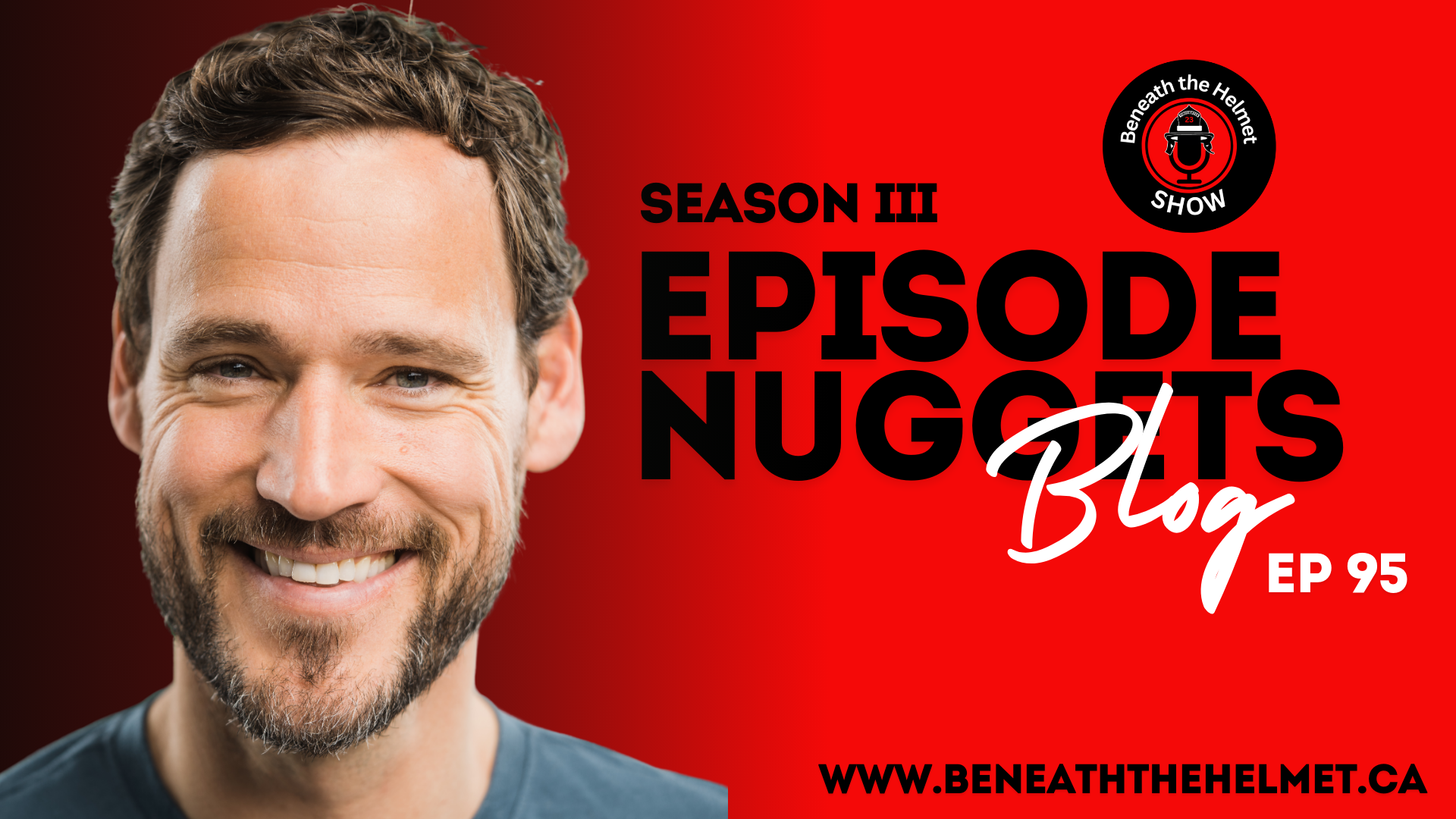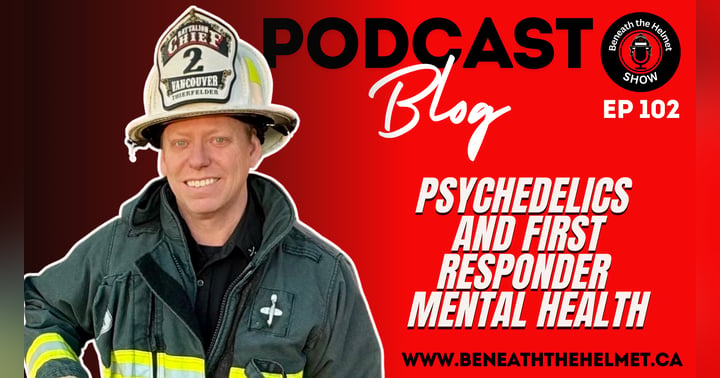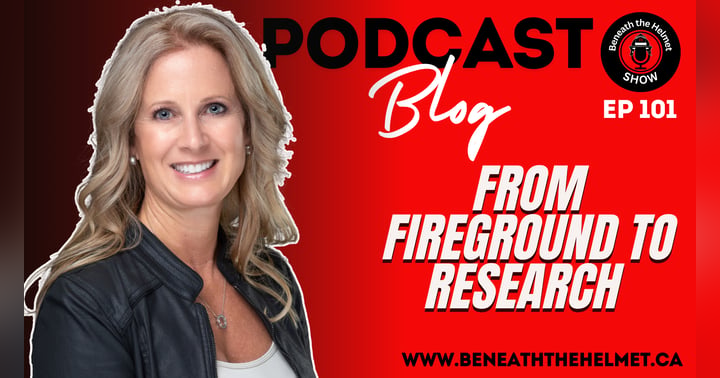Cognitive Resilience for Firefighters with Dr. Nolan Biese

A great conversation on brain health, burnout, and the future of resilience in the fire service
There’s a growing awareness in the fire service that physical fitness alone isn’t enough to keep us healthy and effective across a full career. The job demands something deeper, more foundational, and far easier to overlook. It demands a healthy brain.
In episode 95 of Beneath the Helmet, I sat down with Dr. Nolan Biese, a neuroscientist and co-founder of Circl, a neurotechnology company that measures real-time cognitive resilience. What he shared was honest, science-based, and eye-opening for anyone who has ever pushed through a tough shift, overtime cycle, or long career believing the brain would simply keep up.
It was a conversation about understanding your own cognitive landscape, learning what your brain is carrying beneath the surface, and discovering practical tools to strengthen resilience long before burnout or Operational Stress Injury shows up.
Firefighters pride themselves on strength, problem-solving, and readiness. Yet many are working with depleted cognitive reserves without realizing it. Dr. Biese’s work gives us a window into how our brains are actually performing under stress, how quickly they can deteriorate, and what we can do to protect ourselves.
This episode is a must-listen, and below are the biggest insights worth carrying into your daily life.
Dr. Biese shared how he transitioned from neuroscience research to neurotechnology. His goal was simple: build a tool that can actually help real people, not just generate academic papers. Circl’s tech uses EEG to measure how well your brain processes the world around you. In other words, it measures cognitive resilience: the ability to handle stimuli, think clearly, and access your intelligence under pressure.
Firefighters and first responders, he noted, are some of the most vulnerable to cognitive fatigue. Years of chronic stress, disrupted sleep, shift work, traumatic exposure, and high personal expectations create a perfect storm. Most people don’t notice the decline until something significant breaks. But with tools like Circl, early detection is possible. And when you can measure your brain, you can finally manage it.
The episode explored shift work, sleep, burnout, memory gaps, the hidden costs to departments, the role of joy and fun, and actionable ways to restore a depleted nervous system.
Below are my top five nuggets from this powerful conversation.
My Top 5 Nuggets from the Conversation
1. Your Brain Can't Heal What You Aren’t Willing to See
One of the biggest revelations from Dr. Biese was that many firefighters are functioning at a fraction of their true cognitive capacity without realizing it. He shared stories of highly capable leaders scoring extremely low on their brain resilience assessments. Not because they lacked intelligence, but because they had been exhausted for years.
Many were shocked to see the truth reflected back at them. But that awareness is the turning point. When you finally see what your brain has been trying to carry, you can start doing something about it.
2. Cognitive Resilience Is the New Readiness
Firefighters talk about physical, emotional, and operational readiness, but cognitive readiness often gets left behind. According to Dr. Biese, your ability to process information quickly and accurately is tied directly to sleep, fatigue, stress, and long-term exposure.
When cognitive performance declines, risk increases. Decision-making suffers. Reaction time lags. Memory falters. And the worst part is that this decline can happen slowly enough that you don’t notice it until it affects your life, your relationships, or a moment on the fireground.
Understanding your brain score gives you a roadmap for recovery and a new definition of readiness that includes your mind's health.
3. Sleep and Shift Work Are Silent Threats to Brain Health
Dr. Biese was clear: shift work deeply disrupts the human brain. Firefighters switching from days to nights and back again are asking their nervous system to do something it was never designed for. And when you layer trauma, stress, and adrenaline on top of that, the brain starts operating in survival mode.
He believes research will eventually show that 24-hour shift cycles and unpredictable sleep patterns come with cognitive consequences. Volunteers responding at 3 a.m. face similar challenges. Sleep isn’t a luxury in this work. It’s the backbone of brain resilience.
4. Fun and Joy Aren’t Extras, They’re Neurological Interventions
One of the most insightful parts of the conversation came when we talked about joy. During burnout, many people completely lose the ability to feel joy or access fun. I lived this myself. Dr. Biese explained why: dopamine production plummets, making it nearly impossible to experience pleasure or reward.
His advice was simple and profound: do things that would have made you laugh as a 10-year-old. Play games. Walk in nature. Be silly. Have genuine conversations. Joy restores cognitive flexibility and helps the brain re-learn how to produce dopamine in healthier ways.
5. Cognitive Decline Starts Earlier Than We Think—And Firefighters Are at Higher Risk
Dr. Biese has seen people in their 40s and 50s already diagnosed with dementia. Many come from high-stress operational professions. First responders face elevated risk due to chronic sleep disruption, stress, burnout, Operational Stress Injury, and the emotional load of the work.
This was one of the hardest truths of the conversation. You can't wait until retirement to take care of your brain. Healthy habits in your 30s, 40s, and 50s dramatically shape your brain’s ability to function well in later years. If you plan on enjoying your retirement, cognitive health has to be a priority now.
Cognitive resilience is not about being smart. It is about having the capacity to think clearly, feel connected, and make good decisions when it matters most. Your brain is carrying more than you think. And when you understand what’s happening behind the scenes, you finally regain choice, control, and direction.
This conversation with Dr. Nolan Biese brought science, humanity, and hope together in a way that stands out. It reminded me that resilience is not just about surviving the job, but staying healthy enough to enjoy the life you’ve worked so hard to build.
If this conversation resonated with you, or if you know a firefighter who has been running on empty, share the episode with them. These insights can truly change lives.
Subscribe to Beneath the Helmet to stay connected to the deeper conversations shaping firefighter wellness, leadership, and long-term health.
Stay well.
Arjuna George - Show Host












